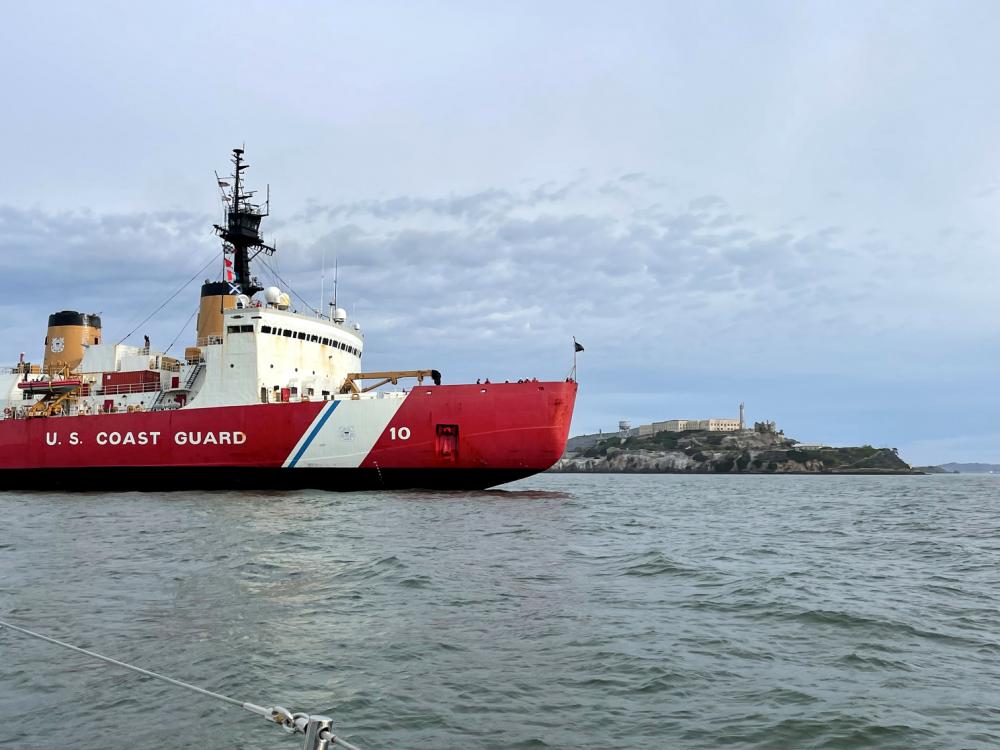Nation’s sole heavy icebreaker returns to the U.S. after a 147-day Antarctic deployment
U.S. Coast Guard sent this bulletin at 04/08/2022 04:03 PM EDT
| News Release |
April 8, 2022 |
Nation’s sole heavy icebreaker returns to the U.S. after a 147-day Antarctic deployment
 |
 |
 |
 |
Editors' Note: Click on images to download high resolution version.
ALAMEDA, Calif. — The 140-member crew of U.S. Coast Guard Cutter Polar Star (WAGB 10) returned to the United States and entered dry dock Friday after completing a 147-day deployment in support of the U.S. Antarctic Program and national interests in Antarctica and the Southern Hemisphere.
The Polar Star’s crew departed their Seattle homeport on Nov. 13, 2021 for the cutter’s 25th Operation Deep Freeze deployment and traveled 24,300 nautical miles to Antarctica and back.
This year marks the 66th iteration of Operation Deep Freeze, an annual joint military service mission in support of the National Science Foundation, the lead agency for the United States Antarctic Program. Since 1955, the U.S. Department of Defense and the Coast Guard have provided air and maritime support across and around the Antarctic continent.
The cutter made several international port calls including stops in Wellington and Lyttelton, New Zealand, and Hobart, Tasmania, Australia. Polar Star’s crew hosted the U.S. Ambassador to New Zealand and members of the Royal New Zealand Navy while in New Zealand.
While in Antarctica, Polar Star transited through more than 450 miles of pack ice and broke a 37-mile channel through seven-foot thick fast ice to McMurdo Station to allow the safe transit and offload of supply vessels Ocean Giant and Maersk Peary.
Polar Star also partnered with the Royal New Zealand Navy to escort the ice-capable logistics ship HMNZS Aotearoa for its first trip to McMurdo Station.
Polar Star transited to the Bay of Whales Feb. 17, setting a record for the furthest south any vessel has navigated, reaching 78 degrees 44 minutes 1.32 seconds south latitude, keeping about 500 yards from the ever shifting Ross Ice Shelf. The cutter also surveyed 396 nautical miles of the ice shelf for future navigational use.
Polar Star spent a total of 65 days in Antarctica, making it the longest Operation Deep Freeze deployment completed by a Coast Guard polar icebreaker in 18 years.
After completing operations in Antarctica, Polar Star moored in Hobart and hosted the Governor of Tasmania, Barbara Baker, and U.S. Consul General Kathleen Lively, along with several other government and military officials that are dedicated to supporting scientific efforts in Antarctica.
“I am so proud of this crew and their accomplishments,” said Capt. William Woityra, commanding officer of the Polar Star. “They overcame constant challenges to complete the mission and set records along the way. They epitomize the values on the Antarctica Service Medal: courage, sacrifice, and devotion. I can think of no better team to lead future expeditions and new icebreakers as the Coast Guard invests in Polar Security Cutters.”
Polar Star did not return to its homeport of Seattle, instead the crew proceeded directly to dry dock in Vallejo, California, to immediately start work on the second phase of a five-year, $75 million Service Life Extension Program. The Coast Guard will replace antiquated technology to ensure the longevity of the nation’s only operational heavy icebreaker while in dry dock this year, supporting the Coast Guard’s enduring commitment to Antarctic operations.
The Coast Guard has been the sole provider of the nation’s polar-icebreaking capability since 1965. Commissioned in 1976, the Polar Star is the United States’ only operational heavy icebreaker. The Coast Guard is increasing its icebreaking fleet with construction of three new Polar Security Cutters (PSC) to ensure persistent national presence and reliable access to the Polar Regions. Coast Guard Commandant Adm. Karl L. Schultz revealed the name of the first PSC – Coast Guard Cutter Polar Sentinel during his 2022 State of the Coast Guard Address.
-USCG-

